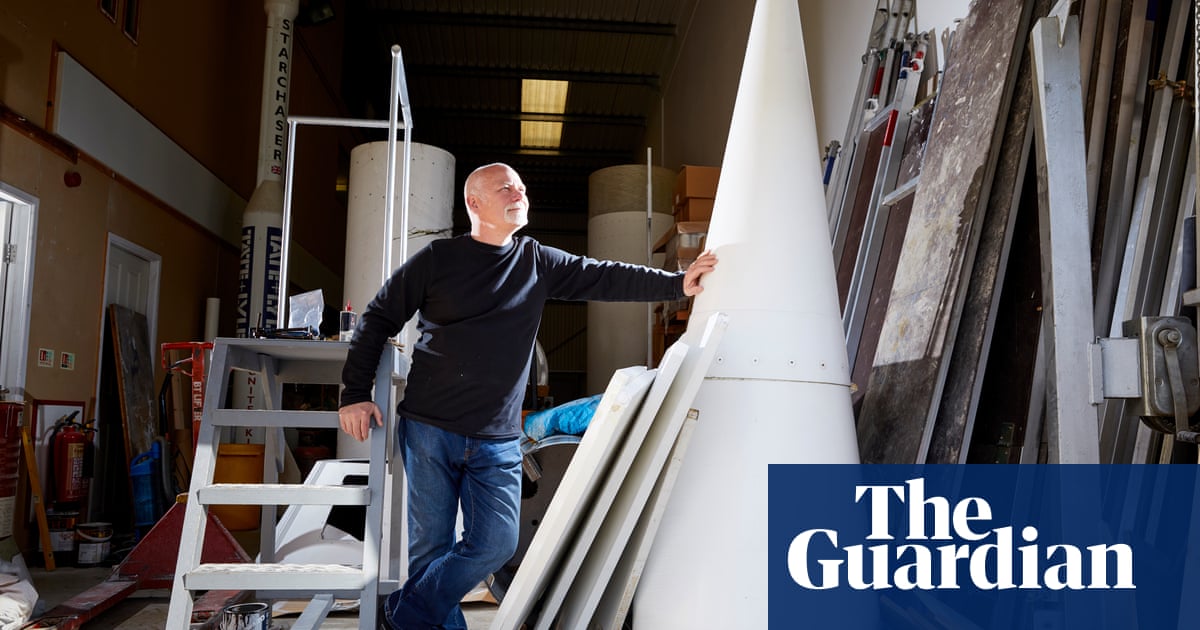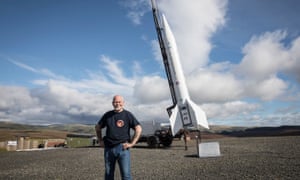Self-taught rocket scientist Steve Bennett is on a mission to make space travel safe and affordable for all from an industrial estate in Greater Manchester

The shutters peel back on a workshop tucked away on an industrial estate in Greater Manchester, and a bright spring light breaks in. White cones and tubular structures lie on their sides next to stepladders and buckets of paint. The neighbouring units here house a sports nutrition company, an NHS wheelchair depot and a building contractor, but lot No 7 is where Steve Bennett builds rockets.
Long before Richard Branson or Elon Musk entered the new space race, Bennett and a small team, comprised mostly of volunteers, have been working towards making affordable commercial suborbital flights a real possibility. Over the past 20 years, on a fraction of their rivals budgets, they have flown about 20 rockets to plot the journey towards their first manned flight.
Nova 2 is their latest project, a 12-metre rocket that they hope will take passengers into space. The rockets engines will burn for about 70 seconds, at which point a capsule will disconnect from the rocket and continue to coast higher. Passengers in the capsule will experience weightlessness, and see the curvature of the Earth and the blackness of space. The capsule will then slip backwards into the atmosphere, before parachuting down to safety. You will well and truly become an astronaut for a few minutes, says Bennett.
His dreams of space, like those of so many, began with the moon landings. He wasnt actually allowed to watch them not live, at least. He grew up in Dukinfielde in Greater Manchester. In 1969, his father was working as a long-distance lorry driver and his mother, who worked in a petrol station, saw no reason for a five-year-old boy to stay up until 3am. Not that it mattered the prospect was enough. I was more excited than anyone I knew, he says. We had no idea what wed find up there.
While most childhood ambitions of becoming an astronaut fall by the wayside, Bennetts intensified as he got older. Aged 12, he opened an account with a local chemist who supplied apparatus to schools. He requested a catalogue, outlined the substances he wanted and skipped lunch for the next two weeks to pay for them. Teachers who recognised his scientific ability tried to steer him away from pyrotechnics, but were unsuccessful. His teenage years were characterised by experiments with explosives: homemade rockets nose-diving into freshly hung laundry; nights in parks entertaining friends with botched attempts.
Once out of school, he spent three years in the army, after which he got married and wound up as a lab technician at the Colgate factory in Salford, testing soaps and toothpastes. It was around this time that he started dabbling in rockets again. I was building them all over the house, he remembers. Living room, dining room. Ive got a great picture of a rocket going all the way up the stairs, with my son Max, whos about three or four, standing next to it completely oblivious.
In 1992, he decided to quit his day job and focus his attention solely on space travel. He set up Starchaser Industries with the ultimate goal of sending paying customers into space. At about the same time, the University of Salford contacted him to ask if he would help with a degree course it was developing with a space element. He was offered a lab, a budget and somewhere to store his rockets outside the family home. It was the first step towards professionalising the operation.
Since then, Starchaser has launched countless rockets some successful, some not. In 2001, it launched Nova 1 from Morecambe Bay, Lancashire at 11 metres tall, it was the largest rocket ever launched from British soil. In 2017, it launched the 8.3-metre-tall Skybolt 2 from the back of a converted truck in Otterburn, a village in Northumberland, making it the largest rocket operational in the UK at that time. Between these high-profile moments there have been years of research, including the development of pioneering hybrid engines and safety systems. Bennett speaks about his achievements with the robustness of an engineer rather than the grandeur of an astronaut less passionate about stars and galaxies than combustible substances and heatproof metals.

The next milestone is launching Nova 2. So far, the capsule has been dropped from the back of a plane with a pilot on board, who steered it to the ground. Bennett now wants to simulate an abort situation, testing a launch escape system that he says will make the rocket far safer than its competitors: I want people to feel as safe as they would flying on an aeroplane. All that now stands in the way of testing crewed flights is resources. If someone gave me 10m, I could get there in 36 months, he says. So if any of your readers have won the lottery recently
Since Richard Branson founded Virgin Galactic in 2004, the private space-travel industry has boomed. To date, Elon Musks SpaceX has raised $2.4bn in funding from investors. Since 2016, Amazons Jeff Bezos has sold $1bn of Amazon stock every year to fund his Blue Origin space tourism project. Starchaser, on the other hand, has had to rely on a mixture of cash sponsors, material donations and as Bennett puts it friends of friends. Alongside support from the universities of Salford and Chester, he has also received a series of donations from a telecoms entrepreneur in return for two seats on the first commercial flight.
Bennett concedes that it has been frustrating at times, watching the new space race play out among the super-rich. Ill tell you what hurts, he says. Im of the opinion that if we had more money, wed get there faster. These are some of the richest people on the planet and theyre still not doing it. You think: Why? Is it an impossible thing to do?
He draws comparisons between the new space race and the advent of aviation at the end of the 19th century. First came the barnstormer phase, experiments in flying machines that enjoyed varying degrees of success. Then flight was mastered, but it was the exclusive pursuit of the wealthy. Bennett believes commercial space flight is transitioning between these two phases; the next few years will see tourists leave Earth, but they will probably all be millionaires. Its what comes next that excites him the most space travel that is safe and affordable for everyone.
Bennett has come to see his lack of wealth as an opportunity to inspire a community-led vision for the future of space travel. I want to share this with as many people as possible, he says. If there are people out there who want to volunteer, fly on the rocket, be part of testing, thats what its all about. I cant do this on my own.
Whether Britain cares is another question. Compared with that of the US or Russia, the UKs relationship with space has always been cautious. The post-second world war government played a background role in the original space race and, in 1975, helped to found the European Space Agency. But in 1988, Kenneth Clarke, then minister for the Department of Trade and Industry, described the ESAs projects as frolics in the sky and funds were cut. While the UK space industrys annual income grew to 14.8bn in 2017, broadcasting accounted for 51% of this, with space observation making up just 3%.
Yet Bennett remains confident the general public is interested. He cites market research conducted by Starchaser that indicates 70% of people would accept the opportunity to travel to space. He also mentions the enormous popularity of Starchasers educational programme Space4Schools, in which the company tours rockets around schools nationwide.
The school visits pay the bills, but they are also key to Starchasers legacy. The solar system, Bennett says, will be key to human survival in the face of climate change, so inspiring the next generation of rocket scientists is crucial. The first person to land on Mars is alive right now and theyre probably at school, he says. If that person turned around and said: I was inspired to do this because this crazy bloke came into my school with a rocket, well, that would be fantastic.


Recent Comments